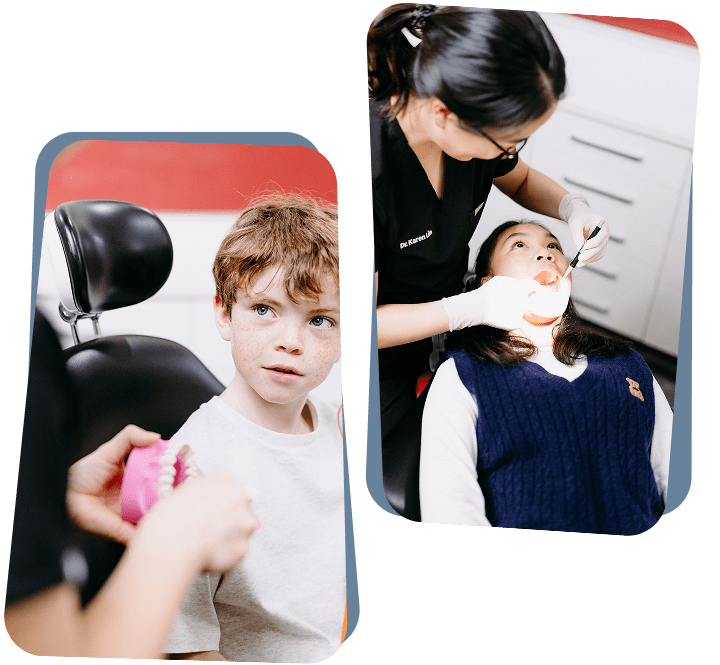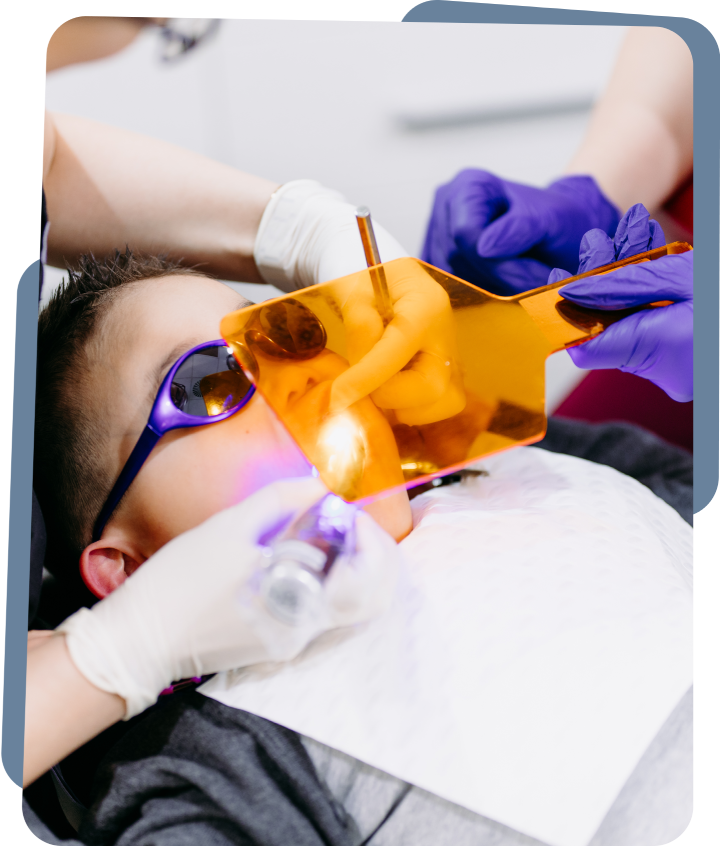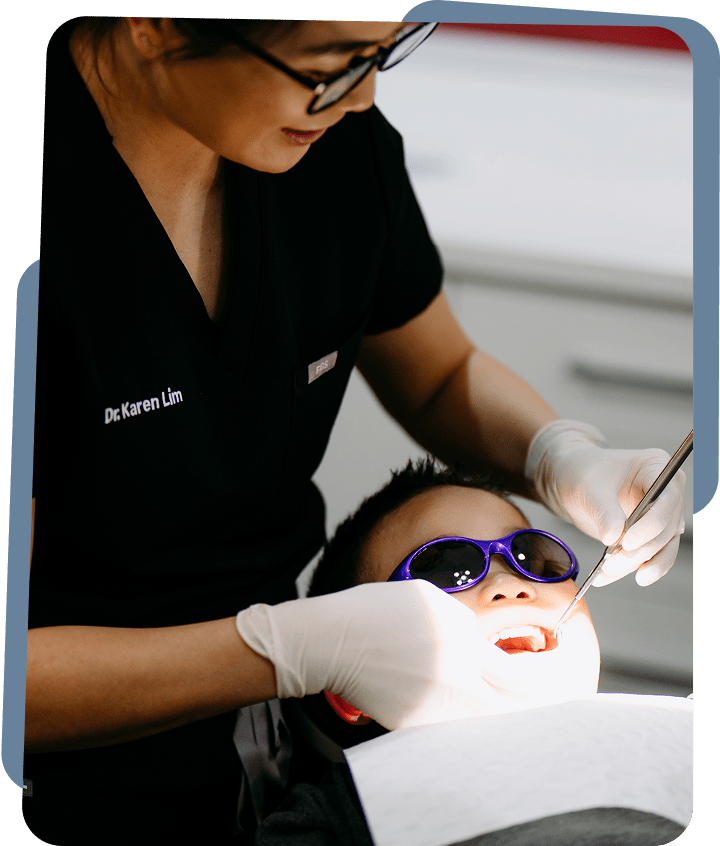Helping to Care for Young Smiles
Fissure Sealants
in Bunbury for Children’s Teeth
Protect growing teeth with fissure sealants in Bunbury. This non-invasive treatment can help lower the likelihood of decay while children develop good brushing habits and consistent oral routines.

Reducing the Risk of Cavities and Decay Harnessing
Not Sure If Sealants Are Right for Your Child? Start Here
- Deep Molar Grooves
Children with deep pits or grooves on their chewing surfaces may be considered candidates for sealants for molars, as these areas are more challenging to keep clean with regular brushing.
- History of Cavities
Children who have had cavities in their baby teeth may be suitable for children’s dental sealants in Bunbury, depending on individual assessment by a dentist. Children may have a higher risk of decay if their diet includes frequent snacking or sugary foods.
- Developing Oral Hygiene
Children still learning to brush effectively may be considered for fissure sealants following a dental assessment. Their daily oral care routines may not always fully clean the deep grooves found in their back teeth.
- Regular Dental Checkups
Children who attend regular checkups may be considered for preventive dental care for children in Bunbury. Their oral health can be monitored to help decide when fissure sealants may be most appropriate.


Helping Protect Your Child’s Teeth
- Cavity Risk ReductionFissure sealants help lower the risk of cavities in the deep grooves of back teeth. This is particularly useful during early school years when children may struggle to clean all tooth surfaces effectively through brushing alone.
- Non-Invasive CareSealants are a drill-free option that supports dental protection for children. The application process is straightforward, which may be considered for children who feel nervous during routine dental appointments.
- Targeted Tooth ProtectionSealants are applied to the chewing surfaces of back teeth to help protect the grooves that often trap food and may lead to decay. Children’s dental sealants in Bunbury are placed on molars, where plaque tends to accumulate.
- Timely Care for Developing TeethSealants are commonly used when children are still learning to brush effectively. They can provide an added barrier during this stage, helping reduce cavity risk while oral hygiene habits are still forming.
We Accept CDBS—Check Your Child’s Eligibility
Eligibility is determined by Medicare. You can confirm your child’s status before booking an appointment— or contact our team, and we can help check eligibility. No referral is needed; just bring your Medicare details.

Our Approach to Children’s Dentistry in Bunbury
-
- Local Dental Care for Bunbury Kids
- We’re part of the Bunbury community, and many of us are parents ourselves. That means we understand local families, schools, and what makes kids feel supported. Our team has provided consistent dental care to local families for many years and is here for the long haul.
-
- Providing Children’s Dental Care in Bunbury Since 2006
- For nearly 20 years, we’ve cared for Bunbury kids with kindness, patience, and clinical know-how. We continue to support local families across generations, offering consistent care in a familiar setting. Our goal is to maintain high standards and constructive visits.
-
- Encouraging Positive Dental Habits in Children
- Children’s dentistry is about more than teeth—it’s about establishing healthy habits and helping children feel comfortable in the dental chair. We aim to provide a welcoming environment tailored to children’s needs. Whether your child is chatty or shy, nervous or fearless, we tailor every appointment to them. Plus, we offer checkups for the whole family in one spot—easy and convenient.
-
- Patient, Child-Focused Dentistry
- Appointments are scheduled with time for children to feel comfortable and ask questions. We explain procedures in clear, age-appropriate ways and adjust to each child’s needs. Every family is different, so we take the time to listen, provide clear information, and work together to make visits calm and constructive from the beginning.
-
- Professional Care for Children’s Oral Health
- Eversmile Dental is guided by clear values and professional standards in children’s dentistry. We provide care that is appropriate for each stage of development, with an emphasis on clear communication and general well-being. Families can expect a consistent approach that prioritises comfort, safety, and continuity of care over time.
-
- Modern Technology for Children’s Dentistry
- We use tools such as EMS Airflow, intraoral scanners, and low-radiation imaging to assist with diagnosis and treatment planning. These technologies can support accuracy and efficiency in dental care, but are always used alongside professional clinical judgement. Technology is part of the approach we take to providing appropriate care for each child.
Frequently Asked Questions
How do fissure sealants work?
Fissure sealants are thin protective coatings applied to the grooves on the chewing surfaces of back teeth. These grooves, called pits and fissures, often trap food and bacteria that a toothbrush can’t easily remove. Over time, this trapped debris may lead to tooth decay, especially in children or teenagers with deep grooves.
First, the tooth is cleaned. Then, a thin liquid sealant is applied, which flows into the tiny grooves. A special light hardens the material, forming a smooth surface that’s easier to keep clean. This protective layer can act as a barrier to food particles and plaque in hard-to-reach areas. Sealants are often placed on molars that come through around the ages of six and twelve, when decay risk tends to increase. Fissure sealants complement your child’s oral care, but brushing, flossing, and regular checkups are still essential.
At what age should fissure sealants be applied?
Do dental sealants wear down over time?
Yes, dental sealants can wear down gradually over time, but this happens slowly and is usually not noticeable right away. Several factors can affect how long sealants continue to act as a barrier to bacteria and plaque. These include:
- Chewing habits:
Biting hard foods like ice or opening packaging with teeth may wear out sealants more quickly. - Tooth grinding (bruxism):
Regular grinding, especially during sleep, can place extra pressure on the chewing surfaces of teeth. - Oral hygiene routine:
Poor brushing habits or a lack of regular checkups may increase the chance of sealants breaking down without being noticed. - Natural wear over time:
Even with good care, sealants may begin to wear down after three to five years of daily chewing and brushing.
How long do fissure sealants last?
The Cochrane Review on pit and fissure sealants highlights that they remain effective for up to five years. Periodic resealing or touch-ups may sometimes be done to help maintain protection. The longevity of fissure sealants depends on several key factors:
- Material type:
Resin-based sealants may last longer than glass ionomer sealants, with studies showing higher retention rates. - Application technique:
Proper isolation during placement helps the sealant bond securely to the tooth, reducing the risk of early failure. - Tooth eruption stage:
Sealants are more successful when applied to fully erupted teeth, as moisture control is easier during the procedure. - Oral hygiene:
Brushing twice daily and attending dental checkups help maintain the sealant’s condition and allow early detection of wear. - Biting and chewing habits:
Chewing on hard foods, such as nuts or ice, or grinding teeth can cause sealants to wear down sooner.
Can you eat after getting fissure sealants?
Yes, you can eat after having fissure sealants placed, usually right away, unless your dental professional advises otherwise. The sealant hardens quickly with a special curing light, eliminating the need to wait for it to set.
While regular meals can resume, some care is recommended in the first 24 hours to help the sealant settle properly. Here are a few helpful tips to follow after getting fissure sealants:
- Start with softer foods:
Choose foods like yoghurt, pasta, or bananas. These put less stress on newly sealed teeth. - Avoid sticky or hard snacks:
Chewing gum, hard lollies, or crunchy foods like popcorn may dislodge the sealant if eaten immediately. - Keep up with regular brushing:
Sealants can provide a barrier over the grooves of the teeth, but good hygiene is still essential for overall oral health. - Schedule regular checkups:
Sealants should be checked during dental visits to assess if they remain intact and continue to function as intended.
How much do fissure sealants cost?
While specific pricing for fissure sealants in Bunbury may vary, the estimated range aligns with the national average of $40 to $100 per tooth. If you’re considering this procedure, our team at Eversmile Dental can provide information about the process and pricing. During your visit, our dental team will explain the procedure and provide an estimate of the cost. They’ll also share any other details you may need to make an informed choice about this preventive care option.
Are sealants worth it?
Fissure sealants are a worthwhile consideration for many children and teenagers as part of a preventive dental care plan. If you’re exploring fissure sealants in Bunbury, here are a few reasons why families often choose them:
- Help reduce decay in hard-to-clean areas:
Sealants can provide a barrier over the grooves of molars, where toothbrush bristles often can’t reach. This can help limit plaque and food build-up. - Non-invasive:
Applying a sealant doesn’t require needles or drilling. Many children tolerate the procedure well. - Cost-effective over time:
Sealants may help lower the likelihood of needing future fillings. - Easy to check and maintain:
Sealants are monitored during regular dental visits and can be retouched or reapplied if worn down.
Are sealants only for kids?
Fissure sealants are most commonly applied to children’s molars, but they may also be considered for adults in some cases. Adults with deep grooves or no history of decay in those teeth may be considered appropriate after a dental assessment. Here are a few situations where sealants might be helpful beyond childhood:
- Deep grooves in molars:
If the chewing surfaces of the molars have deep or narrow pits, food and plaque can easily build up, even with regular brushing. - No previous fillings in molars:
Sealants are only applied to teeth free of decay and fillings, so adults with intact chewing surfaces may be considered for sealants. - Increased decay risk:
Adults undergoing orthodontic treatment, taking medications that reduce saliva, or experiencing dry mouth may be more prone to decay. - Difficulty maintaining oral hygiene:
Back teeth can be more difficult to clean for adults with alignment issues or limited hand mobility.
Can you still get cavities under sealants?
Yes, while fissure sealants help lower the risk of tooth decay, cavities can still develop if certain conditions are present. Here are a few reasons why this may happen, even if a sealant is in place:
- Sealant wear or damage:
Over time, chewing and grinding can wear down or chip the sealant, exposing the underlying tooth structure. - Incomplete cover:
If a sealant doesn’t fully cover the grooves, bacteria and food particles may still get trapped in those areas. - Poor oral hygiene:
Even with sealants, brushing, flossing, and regular dental checkups are needed to maintain overall oral health. - Tooth decay elsewhere on the tooth:
Sealants only protect the chewing surface, not the sides or the spaces between teeth.
What is the difference between a filling and a fissure sealant?
Although fissure sealants and fillings are used to support dental health, they serve very different purposes. Sealants are preventive, while fillings are restorative. If you’re uncertain which kids’ tooth protection treatments in Bunbury apply to your situation, this table can help explain the key differences:
| Category | Fissure Sealant | Filling |
| Purpose | Helps reduce the risk of tooth decay by sealing deep grooves before cavities form | Manages teeth that already have decay or damage |
| Tooth condition | Applied to healthy teeth with no signs of decay | Used when part of the tooth has been affected by decay |
| When it’s used | As a preventive treatment, especially in children and teenagers | When a cavity is present and needs to be addressed |
| Procedure | Non-invasive, no drilling or anaesthetic required | Involves removing decay and restoring the tooth with filling material |
| Materials used | Usually, a thin plastic resin or glass ionomer | Composite resin, amalgam, or other restorative materials |
What are the disadvantages or risks of fissure sealants?
Fissure sealants are widely used, but like any dental treatment, they have some limitations and risks. Understanding these factors can provide general information about preventive dental care for children in Bunbury. Here are a few possible disadvantages to consider:
- Sealants can wear down over time:
Although durable, fissure sealants may chip or wear away due to chewing or grinding, especially if not monitored during checkups. - They only provide a barrier on the sealed surface:
Sealants cover the grooves of back teeth but do not protect the sides or spaces between teeth, so those areas still need cleaning and care. - Sealants are not recommended if decay is already present:
Fissure sealants are applied to healthy teeth. A filling or other treatment may be more appropriate if decay is already present. - May require reapplication:
If a sealant becomes damaged or worn, it may need to be reapplied. - Rare allergic reaction to material:
Allergic reactions to dental sealant material are extremely rare, but patients with known sensitivities should inform their dental provider.
Various Payment Options Available
Eversmile Dental offers a range of flexible payment options to assist patients in managing the cost of their dental care. Please ask our team for details about the payment plans available.
Book Your Appointment Online or Call Our Bunbury Dental Clinic
Book an appointment with our dentist in Bunbury to discuss your oral health needs. We provide tailored dental treatments and clear information to support informed decisions about your dental care.
